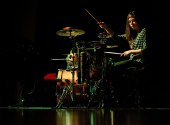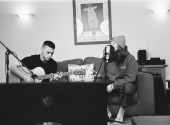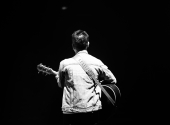
Music is Not Rocket Science #11: Music Therapy
It is a widely accepted fact that sometimes music has an almost magical power over our moods and emotions. But the statement that music can cure conditions, improve quality of life or even save lives may come as a surprise to many of you. From personal experience, I can say that playing the bass guitar has provided me with a safe zone, a home and a refuge from the rigours of everyday life. Whenever I'm in trouble, overwhelmed by depression or feeling empty, lifeless and unmotivated, I grab the instrument and rely on its healing powers. Just play a few grooves and the soul will find its balance again. It's my personal therapy and meditation all in one.
If we look at the idea of music in terms of its therapeutic effect that can positively influence health and behaviour, we get at least as far back in history as Aristotle and Plato, and in some cultures even long before these giants of ancient philosophy. In the 20th century, the profession of music therapy began to formally emerge after World Wars I and II, when community musicians of all types, amateur and professional, went to veterans' hospitals across the country. There, they played for the comfort of their souls and distraction to help former soldiers better endure the physical and emotional traumas of war.
The patients' remarkable physical and emotional reactions to the music eventually led doctors and nurses to request the hiring of musicians by the hospitals. It soon became apparent that the musicians who were playing for the veterans needed prior training after all, and so naturally the demand for a structured college curriculum in music therapy grew.
In the mid-20th century, three key players emerged in the development of music therapy as an organized clinical profession. Psychiatrist and music therapist Ira Altshuler promoted music therapy in Michigan for three decades. Willem van de Wall pioneered music therapy in state-funded institutions and wrote the first "how-to" textbook in 1936, Music in Institutions. E. Thayer Gaston, known as the "father of music therapy", was instrumental in advancing the profession organizationally and educationally. Thus, in the 1940s, (1944), the first music therapy college training programmes were established at Michigan State University, USA, followed by other universities not only in the USA but also in Europe.
Music therapy is a field with a wide range of interests. Music therapists use the experience of music to address the needs of patients in many areas of human functioning. The "application" of music is specifically designed to use the elements of music for therapeutic effects, so that melodies, harmonies, keys, rhythm, textures and instrumentation are used according to the exact purpose they are intended to serve.
Common music therapy practices include communication and motor work with individuals with special needs, composing songs or listening to evoke memories, orientation work with the elderly, processing and relaxation work and rhythmic entrainment for physical rehabilitation for those after stroke. Just to explain, the term "entrainment", also referred to as brainwave synchronization or neural entrainment, refers to the observation that brain waves (large-scale electrical oscillations in the brain) naturally synchronize with the rhythm of periodic external stimuli such as flashing lights, speech, music or tactile stimuli.
Music therapy is used in healthcare facilities, cancer centres, schools, alcohol and drug treatment programs, psychiatric hospitals, nursing homes and correctional facilities. Pretty impressive use of music, which most of us consider just a part of entertainment or even loitering, isn't it?
Music therapy can be active or receptive. Active music therapy engages patients in the actual creation of music, while receptive music therapy leads to listening or responding to live or recorded music. Receptive music therapy involves listening to recorded songs or live musicians. The most commonly used genres are classical, rock, jazz and country. In receptive music therapy, patients are the recipients of the musical experience, which means that they actively listen and respond to the music, but are not the creators of the music.
During the music sessions, patients participate in discussions about the songs, try to relax or have the opportunity to listen to their preferred genre of music. Quite logically, this praiseworthy activity has a positive effect on mood, eliminates stress and pain, allows relaxation and reduces anxiety levels, which helps patients to better manage their conditions or life difficulties. There is even evidence of biochemical changes, where levels of cortisol, a steroid hormone produced and released by the adrenal glands, are reduced. Cortisol affects several aspects of our body, but mainly it helps regulate the stress response.
In active music therapy, patients engage directly in some form of music-making: vocalizing, rapping, singing, playing instruments, improvising, composing or even conducting. Playing the harmonica can increase your lung and breathing volume (which is true for playing all wind instruments, by the way), drums improve coordination, and I can attest that slap grooves improve funky feeling. And of course, a good guitar riff will not only increase your happiness hormone (oxytocin) levels, but maybe even sex appeal.
As you can see, music in medicine provides physical and mental benefits to patients. Music therapists use their techniques to help in many areas, from stress relief before and after surgery to neuropathologies such as Alzheimer's disease. Studies on people diagnosed with mental disorders such as anxiety, depression and schizophrenia have linked greater quality of mental health after receiving music therapy.
I have been saying this for many years, and I will continue to try to promote music in the public space as a holistic solution to not only psychological but also social problems in our society. It is extremely important to educate new generations of musicians and to ensure that all people have active access to music education. Music is not rocket science, it's just needed!
Sources: Wikipedia, musictherapy.org, britannica.com, incadence.org
If you have found an error or typo in the article, please let us know by e-mail info@insounder.org.





